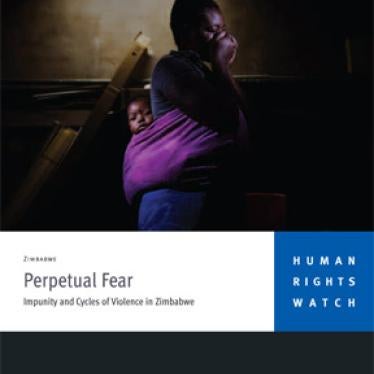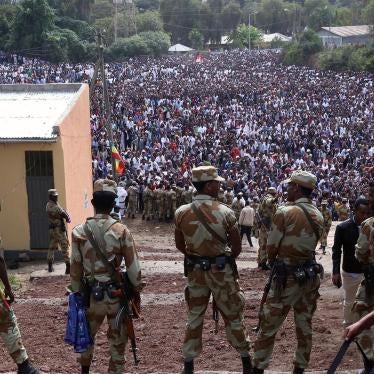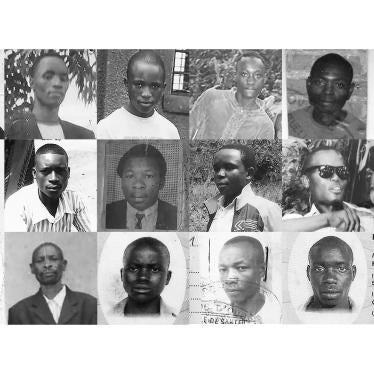Leaders of the Southern African Development Community (SADC) meeting at an emergency summit on Zimbabwe in South Africa on June 11 will be hoping that their tougher stance towards resolving the country's political crisis eventually leads to democratic elections and an end to the crisis. But they have a long and challenging way ahead of them.
President Jacob Zuma of South Africa and his team of facilitators should be commended for their robust engagement on Zimbabwe recently, which has included insisting that elections should not take place in the current environment and drawing up a draft roadmap for elections to be held next year.
However, the two main parties to Zimbabwe's Government of National Unity (GNU), the Zimbabwe African National Union - Patriotic Front (ZANU-PF) and the Movement for Democratic Change (MDC), differ sharply over when elections should be held. ZANU-PF is insisting that elections should be held this year -- under the terms of the Global Political Agreement (GPA) -- and not under SADC stewardship. The MDC persuasively contends that the current environment in Zimbabwe is not conducive to the holding of free, fair and credible elections and would like greater monitoring of the elections by SADC.
ZANU-PF, the former ruling party, has proved to be the main obstacle to holding fair democratic elections. It has yet to demonstrate that it is committed to bringing an end to the country's crisis by ensuring an environment conducive for elections and respect for human rights and the rule of law.
The GPA calls for an end to violence and other abuses as well as the holding of peaceful elections. However, Human Rights Watch has documented numerous incidents of politically motivated violence by ZANU-PF and its allies against real or perceived MDC supporters throughout the country. In the past six months, ZANU-PF-controlled police have arbitrarily arrested scores of civil society activists and routinely threatened and harassed MDC members and supporters.
On 23 May, police in Matebeleland North arrested two activists from the human rights organization ZimRights for convening a workshop on torture and its effects. Lawyers were denied access to the activists for three days before they were released. Police eventually charged one of the activists under a vague criminal law for allegedly "communicating false statements prejudicial to the State."
In another worrying development, a senior commander in the Zimbabwe National Army stated in a local newspaper, the Independent, that the army supported the holding of elections this year and remained loyal to Mugabe. The army's role in Zimbabwe's political crisis and its involvement in politically motivated violence -- in particular during elections in 2008 -- and other abuses has been extensively documented by Human Rights Watch. Local human rights activists report that the army is once again being mobilized in the rural areas and is assisting youth militia and ZANU-PF supporters in intimidating and harassing the rural population.
At an extraordinary meeting held in Zambia in March, SADC leaders received a report back from President Zuma on the situation in Zimbabwe. The report highlighted concerns about widespread human rights violations, including violent attacks on MDC supporters and arbitrary arrests. SADC issued a strong communiqué in support, demanding an end to political violence and arbitrary arrests and calling for an expanded facilitation team to engage with the GNU.
ZANU-PF's response to the communiqué was highly critical and scathing of Zuma's facilitation. On his return from the meeting, Mugabe publicly accused SADC of interfering in the country's sovereignty and its right to hold elections at a time of its choosing.
Given ZANU-PF's continued reluctance to address the repressive human rights environment, it is clear that greater involvement and enhanced monitoring of the elections by SADC is needed. SADC should be looking for resources to create a long-term monitoring mechanism that includes more than just mere observation of the polling day.
SADC leaders should also continue to demand an immediate end to violence, arbitrary arrests and intimidation of civil society activists and MDC supporters, and call for reform of the state security sector which is highly partisan if not fully allied to ZANU-PF.
The regional body should set specific benchmarks and timelines for electoral and human rights reforms in its roadmap and should review every step of the electoral process. SADC leaders need to make it clear that there will be consequences if ZANU-PF fails to adhere to the terms of the election roadmap and the GPA.
Such a robust engagement from SADC is likely to generate the necessary political pressure to achieve positive and concrete results for Zimbabwe and the region as a whole.







